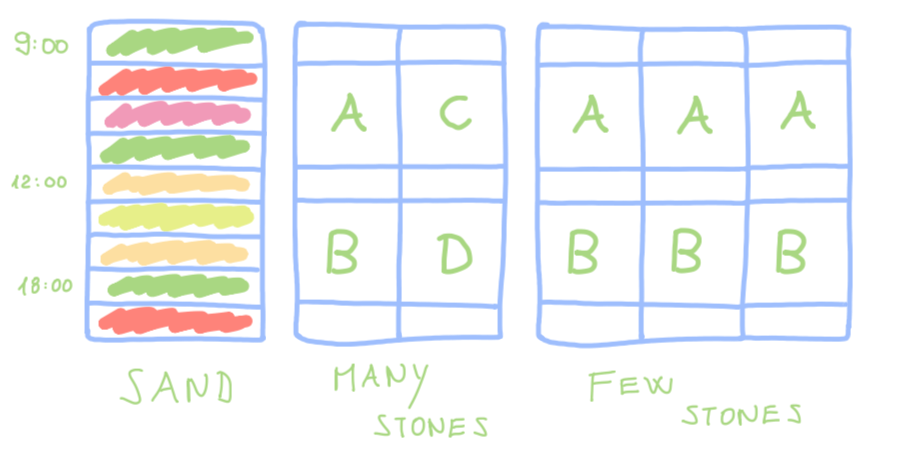♦ 🐆 1 min, 🐌 3 min
Long Run Context Switching
One of the main issues I'm fighting with is that I switch the context all the time. I wake up and for one hour write on productivity, then I start my research work and first do a bit of email, then I do a bit of article reading, then I do a bit of x, then y, then z, ...And before I switch the context, I usually spend an hour or two on the task. For example, today, I worked on one topic for four hours straight with just a few short water and bathroom breaks. I was super focused.But tomorrow, I'll probably get distracted by another work topic and work on that for four hours straight. Then Wednesday on something else. And on and on and on ...I guess you are familiar with the analogy: first, put the stones into the jar, then add the smaller rocks, then the sand. It's time management one o one:

Consistency matters
One of the nice things about ship 30 for 30 is that in 30 days, I've written a substantial amount of short essays on the same topic. I gained momentum on one thing because I kept doing the same thing over and over again.Now I know why I'm having trouble with filling my schedule with stones of the same type. I am disciplined and can focus on the short run but on the long run, oh no. Show me something shiny and exciting, and I'm off to the races like the young bull eager to prove that he can catch that red flag.But here's the thing a lot, a lot of success isn't about how smart you are or how hard you work in the given moment. It's about showing up consistently over time and working and refining the same thing, over and over again.Yes, it's the boring advice that no one wants to hear, but it works.I don't have to look any further than my photography, writing, coding skills or even Physics skill-set I obtained over the last 7 years. I'm relatively good at those things because I practised then—a lot.Now, why do I have trouble with doing the repetitive, mindless work, even though I know that it works in the long run? Well, no matter the experience, the repetitive work is tedious and can become boring. At least at the beginning. Once we get good, we start to enjoy it. But when we are noobs and before we get good, we apparently need to push through.Analysis time
I've been focusing and dropping things systematically for several months now. I managed to achieve some focus, but I'm still doing way too much. What helped me a lot was analysing my schedule daily, weekly, monthly, and checking how many different things I worked on.Are we jumping so we can find the task/type of task that brings us meaning?The next thing is time estimation. We are great at estimating how long one task will take but really bad at estimating how long a sequence of tasks from different areas will take.Get notified & read regularly 👇